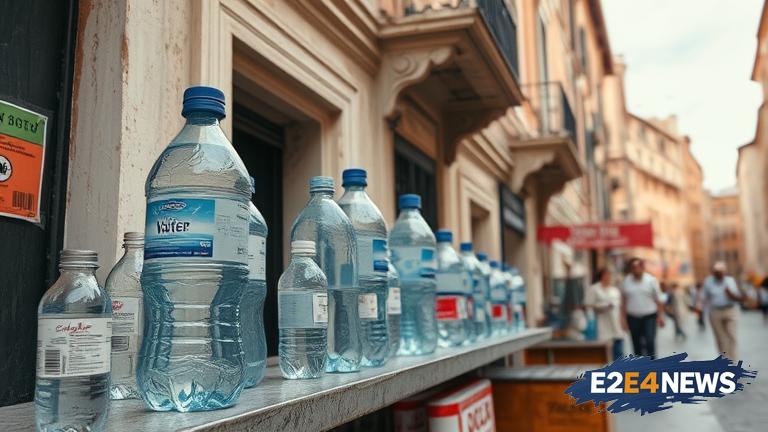When wandering through the historic streets of Rome, it can be tempting to buy a cold bottle of water from a street vendor, especially during the hot summer months. However, this convenient option can have serious consequences for your health and the environment. Many of these vendors sell bottled water that is not properly refrigerated, which can lead to the growth of bacteria and other microorganisms. This can cause a range of illnesses, from mild stomach upset to life-threatening conditions. Furthermore, the bottles themselves are often not recycled, contributing to the already overwhelming problem of plastic waste in Rome. In fact, Italy is one of the largest producers of plastic waste in the European Union, with a significant portion of it ending up in the Mediterranean Sea. The city’s tap water, on the other hand, is safe to drink and of high quality, making it a much more sustainable and healthy option. By choosing to drink tap water, tourists can significantly reduce their environmental impact and help to decrease the demand for single-use plastic bottles. Additionally, many restaurants and cafes in Rome offer free tap water to customers, making it easy to stay hydrated without contributing to the problem. It’s also worth noting that some street vendors may be selling counterfeit or tampered-with bottled water, which can be even more dangerous to consume. The Italian government has implemented various initiatives to reduce plastic waste and promote sustainability, including a ban on single-use plastic bags and a tax on sugary drinks. However, more needs to be done to address the issue of bottled water sales on the streets. Tourists can play a significant role in reducing the demand for bottled water by making informed choices and opting for more sustainable options. By doing so, they can help to protect the environment, preserve the city’s natural resources, and promote a healthier and more sustainable lifestyle. It’s also important to be aware of the social and economic implications of buying bottled water from street vendors. Many of these vendors are migrants or low-income individuals who are trying to make a living, but they may not have the necessary permits or follow proper health and safety protocols. By supporting licensed businesses and choosing sustainable options, tourists can help to promote fair labor practices and support the local community. In conclusion, buying bottled water on the streets of Rome can have serious consequences for your health, the environment, and the local community. By making informed choices and opting for sustainable options, tourists can help to create a positive impact and promote a healthier and more sustainable lifestyle. It’s time to think twice before buying that bottle of water on the street and to consider the broader implications of our actions. The city of Rome is taking steps to reduce plastic waste and promote sustainability, and tourists can play a significant role in supporting these efforts. By choosing to drink tap water and supporting licensed businesses, tourists can help to create a more sustainable and environmentally-friendly city. Ultimately, it’s up to each individual to make a positive impact and to promote a healthier and more sustainable lifestyle. The consequences of buying bottled water on the streets of Rome are far-reaching, and it’s time to take action. So next time you’re wandering through the historic streets of Rome, remember to think twice before buying that bottle of water, and opt for a more sustainable option instead.
